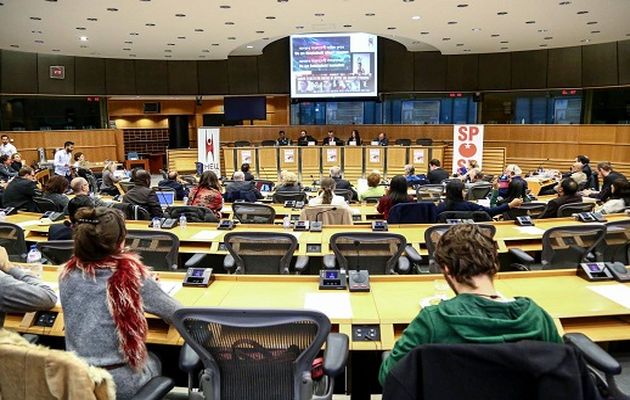A report launched by the EU Intergroup on Freedom of Religion or Belief analyses the restrictions in 53 countries. “Human rights should not be a hobby, they should be a core task for a diplomat.”
 The report was launched on June 30, 2016. / Eu Parliament
The report was launched on June 30, 2016. / Eu Parliament
The European Parliament Intergroup on Freedom of Religion or Belief and Religious Tolerance (FoRB & RT), launched on June 30 its third annual report (read here) on the state of freedom of religion or belief in the world for 2015.
The newly appointed EU Special Envoy for freedom of religion or belief outside the European Union, the former education commissioner Ján Figel attended the event to introduce his mandate, which will be “external-oriented via areas of international cooperation and development.”
The report finds that global restrictions to freedom of religion or belief have continued to be severely restricted in 53 countries.
“This is a document to change the reality through the European Union institutions”, explained its co-president, Peter Van Dalen, a member of the European Parliament. It gives recommendations for the European External Action Service (EEAS), the Council and the European Commission.
“HIGHER ON THE EU AGENDA”
“Tragically, today not everyone enjoys the freedom to hold and manifest their beliefs. We have witnessed the near extinction of Christians in Iraq and Syria; a 150% rise in violent faith-related incidents in Inida since 2014; and in Pakistan the injustice of Asia Bibi’s death sentence for blasphemy continues. Freedom of religion or belief must be higher on the EU’s agenda”, Van Dalen said.
MEP and co-chair of the Intergroup, Dennis de Jong added: “Regrettably, we observe that the EU, in its external actions, continuously compromises its human rights agenda in favour of a more economic and geopolitical agenda. We have witnessed a concerning lack of expertise and knowledge on the EU Guidelines, especially in EU delegations.”
“Human rights should not be a hobby, they should be a core task for a diplomat, who should engage with civil society and religious leaders. We should not allow that human rights ‘go down’ because the EU has other priorities”, De Jong concluded.
 FoRB & RT Logo
FoRB & RT Logo
INSTITUTIONAL RECOMMENDATIONS
To the European External Action Service:
- Further training needed for diplomatic staff in the EU Delegations: awareness of the Guidelines for the promotion of FoRB. Ensuring mandatory training for at least one staff person per Delegation.
- Evaluation of the implementation of the guidelines, particularly in the countries highlighted in the report.
- Country-specific FoRB action plans.
- Support for civil society, including religious or belief organisations that promote FoRB.
Recommendations to the European Commission:
- Extension of the Special Envoy’s mandate to the end of the European Parliament’s term (summer 2019). Ask to work in cooperation.
- Engage in an informal dialogue with the Intergroup.
To the European Council:
- To evaluate the follow-up given to its conclusions by the Commission, the EEAS and Member States at least within half a year after their adoption.
- To encourage ministers to engage directly with religious leaders. Moderate leaders often hold the key to genuine and reconciliation processes in countries and regions torn by religiously motivated conflict.
FAILED STATES
The report classified the countries according to the lack of freedom they “suffer”, and it proposes recommendations to the EU to help those countries.
The worst countries are those that the report calls “failed states”, which “show great instability in many aspects, including the absence of the rule of law, strong internal political, social and/or economic pressures, violence, almost no legitimate authority to make collective decisions, inability to provide public services and so forth, with the overall effect of leaving religious and belief minorities unprotected by the state’s rule of law; and thus entirely exposed to violence.”
Those countries are: Afghanistan, Central African Republic, Libya, Somalia, Syria, and Yemen.
The Intergroup says the EU should:
- Special attention to the position of religious minorities in the context of peace-building.
- Ensure that no weapons are delivered to one of the parties in the internal conflict.
- Send emergency humanitarian aid.
 EU Special Envoy for freedom of religion or belief, Ján Figel.
EU Special Envoy for freedom of religion or belief, Ján Figel.FOCAL COUNTRIES
Besides failed states, the Intergroup distinguishes certain countries as “focal”.
Those countries have been selected on the basis of “human rights violations by the governments or the lack of positive action by the governments to protect religious communities from persecution; and according to the leverage the EU can have. “
The countries listed in this group are: Burma, China, Eritrea, India, Iran, Iraq, Nigeria, North Korea, Pakistan, Saudi Arabia, Sudan, Brunei, and Maldives.
For each country, the report explains its relation with the EU and gives one or two specific recommendations for the EU institutions to help that country.
COUNTRY PROFILES
The report finishes with the description of the 53 countries selected by the Intergroup, where FoRB is seriously under threat.
The data was gathered through civil society organisations, and it focuses in three parameters: religious demographics, government restrictions, and non-governmental restrictions.

Las opiniones vertidas por nuestros colaboradores se realizan a nivel personal, pudiendo coincidir o no con la postura de la dirección de Protestante Digital.
Si quieres comentar o